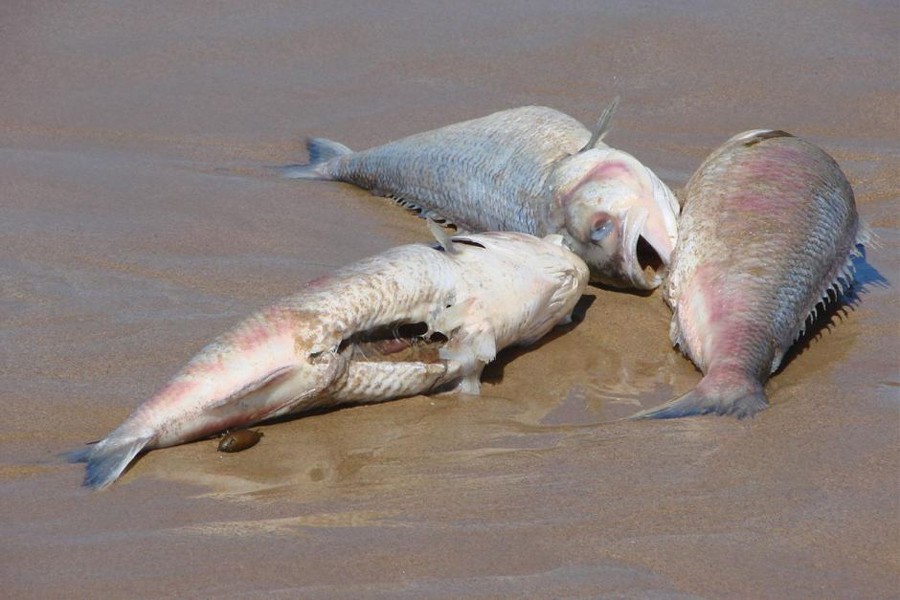Killing the fishes of a fish enclosure or a reserved pond by mixing its water with poison has long been a common occurrence in Bangladesh. It invariably happens in villages. The person whose fishes are brutally poisoned has no enmity with the perpetrators of the crime. What prompts the latter to commit the vile act is jealousy. Outwardly, they hated to see the success of the farmer concerned in commercially raising his fishes without hindrance. The criminals derive a diabolic pleasure from killing the fishes.
On occasions, poor cattle or poultry take the place of the fishes. The cattle are also poisoned, and poultry creatures are savagely burnt. Like in the cases of fish-filled farms, the motive here, too, is plainly causing harm or losses to the persons who have outshone their competitors.
The crux of the matter is the farm owners and the people living in the neighbourhoods know well who the culprits are. But fear of reprisalskeeps them from pointing the finger at the criminal gangs. In the process, many a rising and successful entrepreneur engaged in these farming activities are forced to give up their ventures. Mid-level paddy and other crop growers also fall victim to these mostly organised savageries.
Ripe paddy waiting to be harvested in a day or two is found flattened one fine morning by a speechless farmer. Just a cursory glance at the field is enough to shatter his dreams of marrying one of his adult daughters off, or arranging admission of a son to a nearby college. Apart from an inhuman fit of jealousy over the farmer's good paddy output, a tendency to take revenge for something done by him may also prompt them to go for the evil act.
In a number of cases, influential young rogues spurned by girls are found responsible for many brutalities inflicted on peace-loving village people. The irony is, in spite of their empathy for the affected people, few of their fellow villagers are actively found beside them; let alone taking a protesting stance against the criminal gangs.
Thanks to the rising presence of these dark elements, the age-old reputation of the Bengal villages being synonymous with innocence and altruism continues to be tainted. In almost all of these misdeeds, a definite human trait, driven by narrow mundane interest, is found at work. A riddling aspect of these atrocities, however, is many such revolting crimes are committed in both the villages and cities for no reasons at all. According to some hardened criminals, they engage in mindless barbarities just for the sake of pleasure - which is, indisputably, aberrant and sadistic.
We have to grope for words as we try to explain the fun of pumping air into the stomach of a small boy for no fault of his. These beastly funs led to a number of tragic deaths across the country a few years back. Thanks to timely intervention of the law enforcers leading to the culprits' arrests, the horrific menace could be tolerably dealt with. The acts of dishonouring women including housewives, and inflicting bestiality even on children have been plaguing the country for the last few years.
Notwithstanding the violation of women being a common act of criminality in the country, of late it has assumed frightening proportions. The criminals in many cases these days brutally kill their victims. The act is carried out in cold blood and with a precision that suits only psychopaths. To the bafflement of analysts and the saner sections of society, the incidents of carnal assault on women and girls continue to take place even in the dreadful times of the Covid-19 pandemic. It appears that upon getting away with their acts, the gangs obsessed with demonic pleasures continue to emerge in the country unabated.
Like the satanic forces which have no fear of punishment, as well as no repentance, the orgy of these brutalities hardly stops completely. To the perpetrators, there is no difference between normal and fraught times. Viewing the things from a different perspective, the indulgence in abhorrent activities resorted to by them has many things in common. Thus the poisoning to death sixteen starving and erratically behaving monkeys in Bangladesh recently has uncanny similarities with another diabolic act in southern India.
The second act was prompted by a diabolic desire to take part in a weird fun with a pregnant elephant. The globally publicised episode has two men in India's Kerala state fill in a hollowed out pineapple with firecrackers and put it before an elephant. The wild animal unwittingly picked the deceptive explosive with her trunk and put in its mouth. No sooner had it pressed the pineapple with its jaws, it exploded in its mouth. What the savage fun resulted in was a blood-spilling, terrible wound in the elephant's mouth. The stimuli of the baffled and frightened animal prompted it to run frenetically into a nearby river. It chose a shelter there and passed days and nights just standing submerged in water. Kind people were also there. They threw food at the animal which was crying aloud, writhing in wounds from the explosion and burns. The starving animal tried to eat the food offered to it. It couldn't munch any. Starving and weakened, the poor animal finally died - standing in water.
Amazingly, Kerala is widely known for its high rate of literacy and lots of other achievements as well as the enlightened character of its general people. But this is how the pure wickedness of a handful of people brings infamy for a whole population. History is replete with instances of savageries targeting humans. Only a few centuries ago, open trading in chained African black slaves in the civilised part of the world was a common scenario. Like the angelic or altruistic one, the satanic essence of man, notably that of Vlad the Impaler, Hitler, Halaku Khan et al, also distinguishes man by contrast - proverbially the best of all creations.


